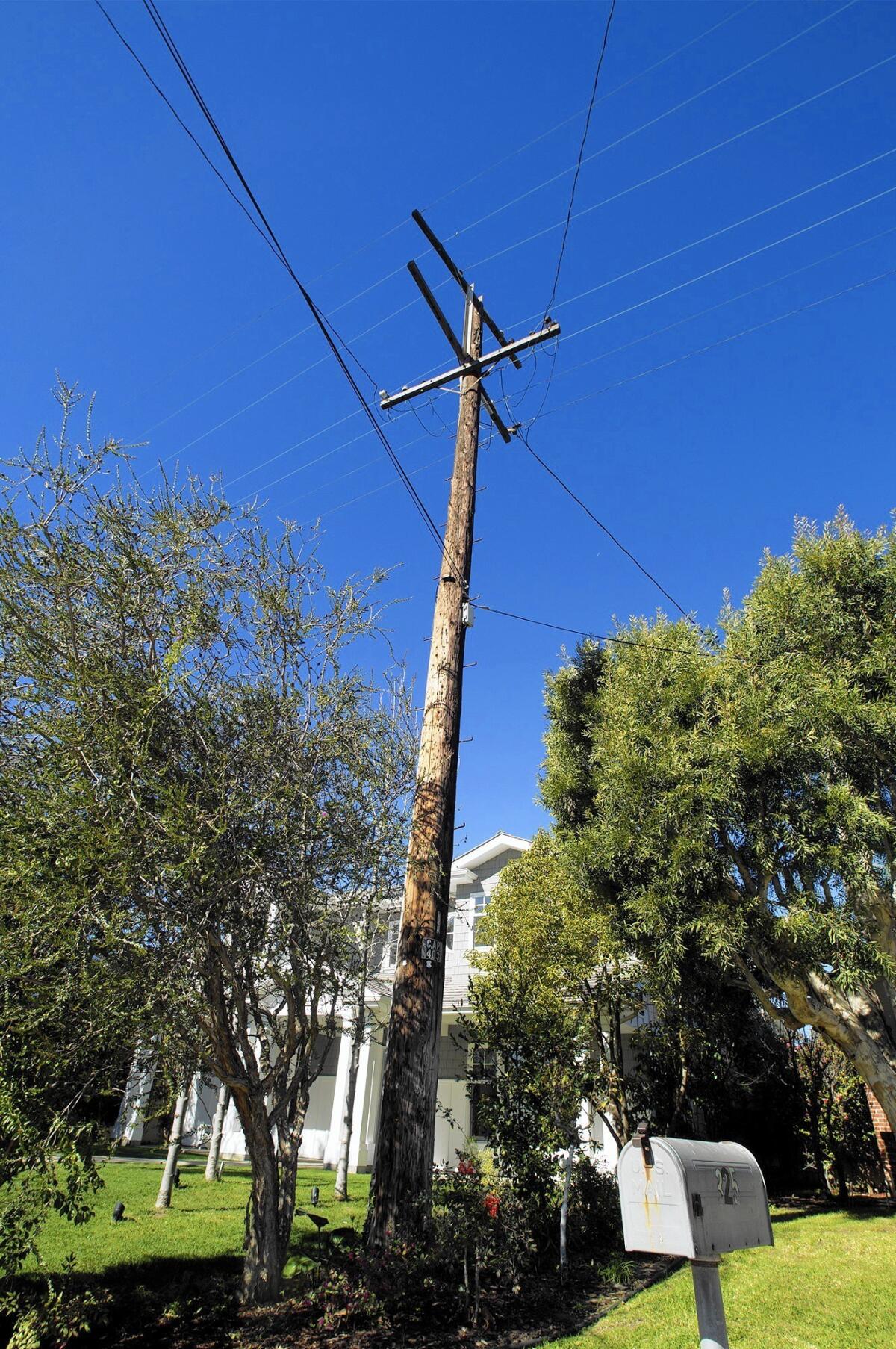Newport Heights utility undergrounding moves toward neighborhood vote

- Share via
Underground utilities, a hotly debated topic in Newport Heights for more than a year, could soon become a reality.
After more than an hour of passionate testimony Tuesday in which residents of the Newport Beach neighborhood debated the benefits and challenges of placing utility lines underground, the City Council voted 4-1 to waive a petition guideline and move toward a neighborhood vote, possibly in the fall.
Councilman Tony Petros, who represents Newport Heights, dissented.
Councilman Keith Curry and Mayor Pro Tem Kevin Muldoon recused themselves because of their interests in telecommunications companies. Curry owns stock in AT&T and Muldoon is vice president and general counsel for Irvine-based 5 Bars.
“What really tears me apart is the tension and dissension in the community,” Mayor Diane Dixon said. “A vote will resolve this one way or another.”
Poles strung with utility lines have peppered Newport Heights for decades. Homeowners in the area known as District 114 — bordered by Tustin and Irvine avenues, 15th Street and Cliff Drive — and the area known as District 114b — bounded by Riverside and Tustin avenues, 15th Street and Cliff Drive — have been collecting petition signatures in an attempt to establish an assessment district to pay to place electric, phone and cable lines underground and out of sight.
Proponents in both districts have received signatures from more than 50% of the contacted homeowners, according to a city staff report. The districts contain a total of about 300 properties.
Typically, the first step before the city can form a utility undergrounding assessment district is that at least 60% of the homeowners in the neighborhood must sign a form expressing interest, according to city rules.
If the quota is met, the city would pay to get an estimate of the project’s cost from the utility companies and hold a neighborhood election. If 51% of the homeowners vote in favor, the project is approved and all property owners in the area must pay an equal amount of the cost.
However, state law allows the process to move forward after 50% of homeowners have signed the petition.
Proponents of the Newport Heights project asked the City Council — and it agreed — to lower the threshold to 50% to speed up the process. The urgency stems in part from a $4 million city sewer rehabilitation and alley reconstruction project expected in the next year in Newport Heights.
Placing the utility lines underground at the same time other improvements are underway would likely save homeowners money because they wouldn’t have to tear up the alleys again and repave them for the undergrounding project, proponents and city staff say.
Proponents have said placing the lines underground would eliminate the potential hazard of downed power lines and could improve property values.
“This will be the lowest-cost opportunity [to underground],” said resident Mike Hefner. “We feel confident this would pass if given the opportunity to vote.”
However, opponents argue the percentage of homeowners supporting the project is likely much lower because some signed the documents without understanding their significance. Twenty-one residents who signed later rescinded their support, according to city staff.
Many opponents who spoke during Tuesday’s meeting said they believe the petition process wasn’t transparent.
The project cost has been estimated at $20,000 to $25,000 per house, payable in installments, plus variable costs of $1,000 to $4,000 to hook up each home’s underground power lines to Southern California Edison.
Resident Tom Newman spoke against lowering the petition threshold and said undergrounding would be a financial burden to many of his neighbors.
“They don’t have the resources to do this,” Newman said. “I’m asking you to stay the course. We have rules and we shouldn’t be changing them for something so important.”
Petros agreed, saying the council is beginning to make a habit of ignoring established rules.
“At some point we need to follow the rule or change it,” he said. “I would hope as we move forward we could find a sweet spot to do what we say.”
An engineer’s report that will provide a more exact cost of placing the lines underground will be prepared in coming months before the assessment ballots are circulated.
City staff expects the vote to occur in October.
This isn’t the first time undergrounding has been pursued in Newport Heights.
In June, proponents in District 118 — bounded by 15th Street, Tustin Avenue, Cliff Drive and Old Newport Boulevard — suspended their signature-collecting effort after a year for lack of support.
Proponents in District 114 also were collecting signatures at the time and continued after District 118 stopped.
District 114b was created as a smaller spinoff of District 118 to continue signature collection among 50 homes. The creation of another district was surprising to some residents who thought the issue was moot.
Twitter: @HannahFryTCN
